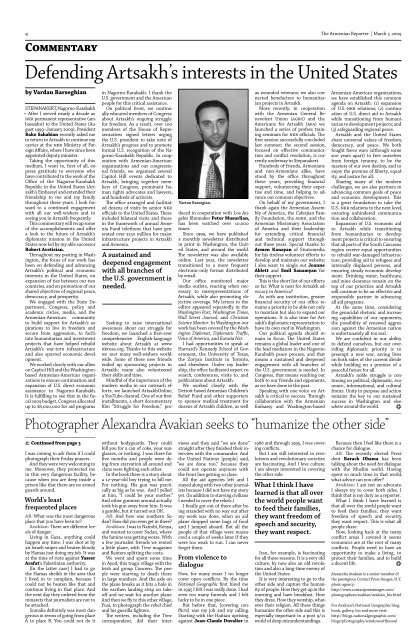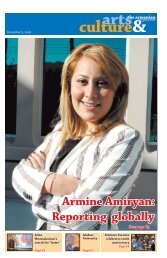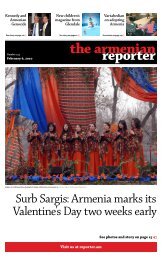National, International, Armenia, and Community News and Opinion
National, International, Armenia, and Community News and Opinion
National, International, Armenia, and Community News and Opinion
Create successful ePaper yourself
Turn your PDF publications into a flip-book with our unique Google optimized e-Paper software.
The <strong>Armenia</strong>n Reporter | March 7, 2009<br />
Commentary<br />
Defending Artsakh’s interests in the United States<br />
by Vardan Barseghian<br />
Stepanakert, Nagorno-Karabakh<br />
– After I served nearly a decade as<br />
NKR permanent representative (ambassador)<br />
to the United States (August<br />
1999–January 2009), President<br />
Bako Sahakian recently asked me<br />
to return to Artsakh to continue my<br />
carrier at the NKR Ministry of Foreign<br />
Affairs, where I have since been<br />
appointed deputy minister.<br />
Taking the opportunity of this<br />
medium, I want to, first of all, express<br />
gratitude to everyone who<br />
have contributed to the work of the<br />
Office of the Nagorno-Karabakh<br />
Republic in the United States (Artsakh’s<br />
Embassy) <strong>and</strong> extended their<br />
friendship to me <strong>and</strong> my family<br />
throughout these years. I look forward<br />
to a continued engagement<br />
with all our well-wishers <strong>and</strong> to<br />
seeing you in Artsakh frequently.<br />
This commentary will recap some<br />
of the accomplishments <strong>and</strong> offer<br />
a look to the future of Artsakh’s<br />
diplomatic mission in the United<br />
States now led by my able successor<br />
Robert Avetisian.<br />
Throughout my posting in Washington,<br />
the focus of our work has<br />
been on defending <strong>and</strong> advancing<br />
Artsakh’s political <strong>and</strong> economic<br />
interests in the United States, on<br />
expansion of ties between our two<br />
countries, <strong>and</strong> on promotion of our<br />
shared objectives of regional peace,<br />
democracy, <strong>and</strong> prosperity.<br />
We engaged with the State Department,<br />
Congress, policy <strong>and</strong><br />
academic circles, media, <strong>and</strong> the<br />
<strong>Armenia</strong>n-American community<br />
to build support for Artsakh’s aspirations<br />
to live in freedom <strong>and</strong><br />
secure from aggression, to facilitate<br />
humanitarian <strong>and</strong> investment<br />
projects that have helped rebuild<br />
Artsakh’s war-torn infrastructure<br />
<strong>and</strong> also spurred economic development.<br />
We worked closely with our allies<br />
on Capitol Hill <strong>and</strong> the Washingtonbased<br />
<strong>Armenia</strong>n-American organizations<br />
to ensure continuation <strong>and</strong><br />
expansion of U.S. direct economic<br />
assistance to Nagorno-Karabakh.<br />
It is fulfilling to see that in the fiscal<br />
2009 budget, Congress allocated<br />
up to $8,000,000 for aid programs<br />
in Nagorno-Karabakh. I thank the<br />
U.S. government <strong>and</strong> the American<br />
people for this critical assistance.<br />
On political front, we continually<br />
educated members of Congress<br />
about Artsakh’s ongoing struggle<br />
for freedom. As a result, over 100<br />
members of the House of Representatives<br />
signed letters urging<br />
the U.S. president to take note of<br />
Artsakh’s progress <strong>and</strong> to promote<br />
formal U.S. recognition of the Nagorno-Karabakh<br />
Republic. In cooperation<br />
with <strong>Armenia</strong>n-American<br />
organizations <strong>and</strong> our congressional<br />
friends, we organized several<br />
Capitol Hill events dedicated to<br />
Artsakh, bringing together members<br />
of Congress, prominent human<br />
rights advocates <strong>and</strong> lawyers,<br />
<strong>and</strong> hundreds of activists.<br />
The office arranged <strong>and</strong> facilitated<br />
dozens of visits by senior NKR<br />
officials to the United States. These<br />
included bilateral visits <strong>and</strong> those<br />
in the framework of annual <strong>Armenia</strong><br />
Fund telethons that have generated<br />
over $150 million for major<br />
infrastructure projects in Artsakh<br />
<strong>and</strong> <strong>Armenia</strong>.<br />
A sustained <strong>and</strong><br />
deepened engagement<br />
with all branches of<br />
the U.S. government is<br />
needed.<br />
Seeking to raise international<br />
awareness about our struggle for<br />
freedom, we launched a first-ever<br />
Vartan Barsegian.<br />
comprehensive English-language<br />
website about Artsakh at www.<br />
nkrusa.org. Thanks to this website<br />
we met many well-wishers worldwide.<br />
Some of these new friends<br />
ended up sponsoring projects in<br />
Artsakh; many also volunteered<br />
their skills <strong>and</strong> time.<br />
Mindful of the importance of the<br />
modern media in our outreach efforts,<br />
we launched ArtsakhOnline,<br />
a YouTube channel. One of our first<br />
installments, a short documentary<br />
film “Struggle for Freedom,” produced<br />
in cooperation with Los Angeles<br />
filmmaker Peter Musurlian,<br />
has been watched over 10,000<br />
times.<br />
Since 1999, we have published<br />
a monthly newsletter distributed<br />
in print in Washington, the United<br />
States, <strong>and</strong> around the world.<br />
The newsletter was also available<br />
online. Last year, the newsletter<br />
transitioned to a more frequent<br />
electronic-only format distributed<br />
by email.<br />
Our office monitored major<br />
media outlets, reacting when necessary<br />
to misrepresentations of<br />
Artsakh, while also promoting objective<br />
coverage. My letters to the<br />
editor appeared repeatedly in the<br />
Washington Post, Washington Times,<br />
Wall Street Journal, <strong>and</strong> Christian<br />
Science Monitor. In Washington our<br />
work has been covered by the Washington<br />
Diplomat, Diplomatic Traffic,<br />
Voice of America, <strong>and</strong> Eurasia Net.<br />
I had opportunities to speak at<br />
Harvard’s Kennedy School of Government,<br />
the University of Texas,<br />
the Zoryan Institute in Toronto,<br />
<strong>and</strong> elsewhere. Under my leadership,<br />
the office facilitated expert research,<br />
conferences, visits to, <strong>and</strong><br />
publications about Artsakh.<br />
We worked closely with the<br />
Detroit-based <strong>Armenia</strong>n Children’s<br />
Relief Fund <strong>and</strong> other supporters<br />
to sponsor medical treatment for<br />
dozens of Artsakh children, as well<br />
as wounded veterans; we also connected<br />
benefactors to humanitarian<br />
projects in Artsakh.<br />
More recently, in cooperation<br />
with the <strong>Armenia</strong>n General Benevolent<br />
Union (AGBU) <strong>and</strong> the<br />
Americans for Artsakh (AFA) we<br />
launched a series of profess training<br />
seminars for NKR officials. The<br />
first session successfully concluded<br />
last summer; the second session,<br />
focused on effective communication<br />
<strong>and</strong> conflict resolution, is currently<br />
underway in Stepanakert.<br />
Hundreds of friends, <strong>Armenia</strong>ns<br />
<strong>and</strong> non-<strong>Armenia</strong>ns alike, have<br />
stood by the office throughout<br />
these years, providing financial<br />
support, volunteering their expertise<br />
<strong>and</strong> time, <strong>and</strong> helping to advance<br />
our common objectives.<br />
On behalf of my government, I<br />
thank again the <strong>Armenia</strong>n Assembly<br />
of America, the Cafesjian Family<br />
Foundation, the AGBU, <strong>and</strong> the<br />
<strong>Armenia</strong>n Missionary Association<br />
of America <strong>and</strong> their leadership<br />
for extending critical financial<br />
<strong>and</strong> technical support throughout<br />
these years. Special thanks to<br />
Armen Kanayan of Stratomedia<br />
for his tireless volunteer efforts to<br />
develop <strong>and</strong> maintain our website;<br />
I also want to single out Joanne<br />
Ablett <strong>and</strong> Emil Sanamyan for<br />
their support.<br />
This is the short list of our efforts<br />
so far. What is next for Artsakh advocacy<br />
in America?<br />
As with any institution, greater<br />
financial security of our office remains<br />
a priority to be able not only<br />
to maintain but also to exp<strong>and</strong> our<br />
operations. It is also time for Artsakh’s<br />
diplomatic representation to<br />
have its own roof in Washington.<br />
Our political agenda should remain<br />
in focus. The United States<br />
remains a global leader <strong>and</strong> one of<br />
the lead mediators in the Nagorno-<br />
Karabakh peace process, <strong>and</strong> that<br />
means a sustained <strong>and</strong> deepened<br />
engagement with all branches of<br />
the U.S. government is needed. In<br />
Congress, that means reaching out<br />
both to our friends <strong>and</strong> opponents,<br />
as we have done in the past.<br />
Speaking with one voice on Artsakh<br />
is critical to success. Through<br />
collaboration with the <strong>Armenia</strong>n<br />
Embassy <strong>and</strong> Washington-based<br />
<strong>Armenia</strong>n-American organizations,<br />
we have established this common<br />
agenda on Artsakh: (1) expansion<br />
of U.S.-NKR relations; (2) continuation<br />
of U.S. direct aid to Artsakh<br />
while transitioning from humanitarian<br />
to development projects; <strong>and</strong><br />
(3) safeguarding regional peace.<br />
Artsakh <strong>and</strong> the United States<br />
share universal values of freedom,<br />
democracy, <strong>and</strong> peace. We both<br />
fought fierce wars (although some<br />
200 years apart) to free ourselves<br />
from foreign tyranny, to be the<br />
masters of our own destiny, <strong>and</strong> to<br />
enjoy the promise of liberty, equality,<br />
<strong>and</strong> justice for all.<br />
Sharing many of the modern<br />
challenges, we are also partners in<br />
advancing common goals of peace<br />
<strong>and</strong> economic development. This<br />
is a great foundation to take the<br />
U.S.-NKR relations to the next level,<br />
ensuring unhindered communication<br />
<strong>and</strong> collaboration.<br />
Expansion of U.S. economic aid<br />
to Artsakh while transitioning<br />
from humanitarian to development<br />
projects is critical to ensuring<br />
that all parts of the South Caucasus<br />
region receive equal opportunities<br />
to rebuild war-damaged infrastructure,<br />
providing aid to refugees <strong>and</strong><br />
internally displaced persons, <strong>and</strong><br />
ensuring steady economic development.<br />
Drinking water, healthcare,<br />
<strong>and</strong> mine clearance remain on the<br />
top of our priorities <strong>and</strong> Artsakh<br />
will continue to be an effective <strong>and</strong><br />
responsible partner in advancing<br />
all aid programs.<br />
At the same time, considering<br />
the genocidal rhetoric <strong>and</strong> increasing<br />
capabilities of our opponents,<br />
the possibility of renewed aggression<br />
against the <strong>Armenia</strong>n nation<br />
is unfortunately all too real.<br />
We are confident in our ability<br />
to defend ourselves, but our overriding<br />
diplomatic priority is to<br />
preempt a new war, saving lives<br />
on both sides of the current divide<br />
while building on a promise of a<br />
peaceful future for all.<br />
Artsakh’s noble struggle is continuing<br />
on political, diplomatic, economic,<br />
informational, <strong>and</strong> cultural<br />
fronts. Unity in purpose <strong>and</strong> action<br />
remains the key to our sustained<br />
success in Washington <strong>and</strong> elsewhere<br />
around the world. f<br />
Photographer Alex<strong>and</strong>ra Avakian seeks to “humanize the other side”<br />
n Continued from page <br />
I was coming to ask them if I could<br />
photograph their Friday prayers.<br />
And they were very welcoming to<br />
me. Moreover, they protected me<br />
in this very dangerous facility, because<br />
when you are deep inside a<br />
prison like that there are no armed<br />
guards around.<br />
World’s least<br />
frequented places<br />
AR: What was the most dangerous<br />
place that you have been to?<br />
Avakian: There are different levels<br />
of danger.<br />
Living in Gaza, anything could<br />
happen any time. I was shot at by<br />
an Israeli sniper <strong>and</strong> beaten bloody<br />
by Hamas just doing my job. It was<br />
at the time of riots against Yasser<br />
Arafat’s Palestinian authority.<br />
[In the latter case] I had to go<br />
the Hamas sheikh in the area that<br />
I lived in to complain, because I<br />
could not be beaten like that <strong>and</strong><br />
continue living in that place. And<br />
the next day they ordered from the<br />
minarets that journalists are not to<br />
be attacked.<br />
Somalia definitely was most dangerous<br />
in terms of going from place<br />
A to place B. You could not do it<br />
without bodyguards. They could<br />
kill you for a can of coke, your sunglasses,<br />
or nothing. I was there for<br />
five months <strong>and</strong> people were dying<br />
from starvation all around <strong>and</strong><br />
clans were fighting each other.<br />
In the book there is a story about<br />
a 12-year-old boy trying to kill me.<br />
For nothing. His gun was practically<br />
as big as he was. And I yelled<br />
at him, “I could be your mother.”<br />
And other gunmen around actually<br />
took his gun away from him. It was<br />
a gamble, but it turned out OK.<br />
AR: And how was southern Sudan?<br />
How did you even get in there?<br />
Avakian: I was in Nairobi, Kenya,<br />
<strong>and</strong> wanted to cover Sudan, where<br />
the famine was getting worse. With<br />
a few journalist friends we rented<br />
a little plane, with Time magazine<br />
<strong>and</strong> Reuters splitting the costs.<br />
We went <strong>and</strong> spent some time<br />
in Ayod, this tragic village with the<br />
Irish aid group Concern. The people<br />
were starving to death there<br />
in large numbers. And the axle on<br />
the plane breaks as it hits a hole in<br />
the earthen l<strong>and</strong>ing strip on takeoff<br />
<strong>and</strong> we wait for another plane.<br />
And then we fly to this other village,<br />
Yuai, to photograph the rebel chief<br />
<strong>and</strong> his guerilla fighters.<br />
The writers, including the Time<br />
correspondent, did their interviews<br />
<strong>and</strong> they said “we are done”<br />
straight after they finished their interview<br />
with the comm<strong>and</strong>er. And<br />
the United Nations [people] said,<br />
“we are done too,” because they<br />
could not operate anymore with<br />
the front line getting so close.<br />
All the aid agencies left <strong>and</strong> I<br />
stayed along with two other journalists<br />
because I did not have my story<br />
yet. (In addition to starving civilians<br />
I needed to cover the rebels.)<br />
I finally got out of there after being<br />
str<strong>and</strong>ed with no way out after<br />
my work was done, when an aid<br />
plane dropped some bags of food<br />
<strong>and</strong> I jumped aboard. But all the<br />
people of that village were massacred<br />
a couple of weeks later if they<br />
were too weak to run. I can never<br />
forget them.<br />
From violence to<br />
dialogue<br />
Now, for many years I no longer<br />
cover open conflicts. By the time<br />
<strong>National</strong> Geographic first hired me<br />
in 1995 I felt I was really done. I had<br />
seen too many funerals <strong>and</strong> I felt<br />
lucky to be in one piece.<br />
But before that, [covering conflicts]<br />
was my job <strong>and</strong> my calling.<br />
Starting with the Haitian uprising<br />
against Jean-Claude Duvalier in<br />
1986 <strong>and</strong> through 1995, I was covering<br />
conflicts.<br />
But I am still interested in revolutions<br />
<strong>and</strong> revolutionary societies<br />
are fascinating. And I love culture.<br />
I am always interested in covering<br />
the other side.<br />
What I think I have<br />
learned is that all over<br />
the world people want<br />
to feed their families,<br />
they want freedom of<br />
speech <strong>and</strong> security,<br />
they want respect.<br />
Iran, for example, is fascinating<br />
for all those reasons. It is a very old<br />
culture, by now also an old revolution<br />
<strong>and</strong> also a long-time enemy of<br />
the United States.<br />
It is very interesting to go to the<br />
other side <strong>and</strong> capture the humanity<br />
of people. How they get up in the<br />
morning <strong>and</strong> have breakfast. How<br />
they dress. How they worship, whatever<br />
their religion. All these things<br />
humanize the other side <strong>and</strong> this is<br />
especially important in a post 9/11<br />
world of deep misunderst<strong>and</strong>ings.<br />
Because then I feel like there is a<br />
chance for dialogue.<br />
AR: The recently elected President<br />
Barack Obama has been<br />
talking about the need for dialogue<br />
with the Muslim world. Having<br />
spent so much time in that world,<br />
what advice can you offer?<br />
Avakian: I am not an advocate.<br />
I always try to cover both sides. I<br />
think that is my duty as a reporter.<br />
What I think I have learned is<br />
that all over the world people want<br />
to feed their families, they want<br />
freedom of speech <strong>and</strong> security,<br />
they want respect. This is what all<br />
people share.<br />
Now, looking back at the many<br />
conflict areas I covered it seems<br />
economics are at the root of many<br />
conflicts. People need to have an<br />
opportunity to make a living, to<br />
protect their families, <strong>and</strong> to build<br />
a decent life.<br />
f<br />
Alex<strong>and</strong>ra Avakian is a senior member of<br />
the prestigious Contact Press Images, N.Y.<br />
photo agency:<br />
http://www.contactpressimages.com/<br />
photographers/avakian/avakian_bio.html<br />
For Avakian’s <strong>National</strong> Geographic blog,<br />
book, gallery, bio <strong>and</strong> more visit:<br />
http://blogs.nationalgeographic.com/<br />
blogs/photography/windowsofthesoul

















